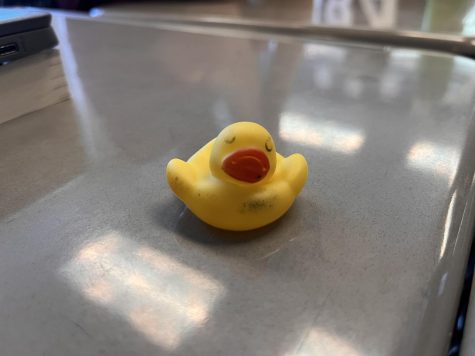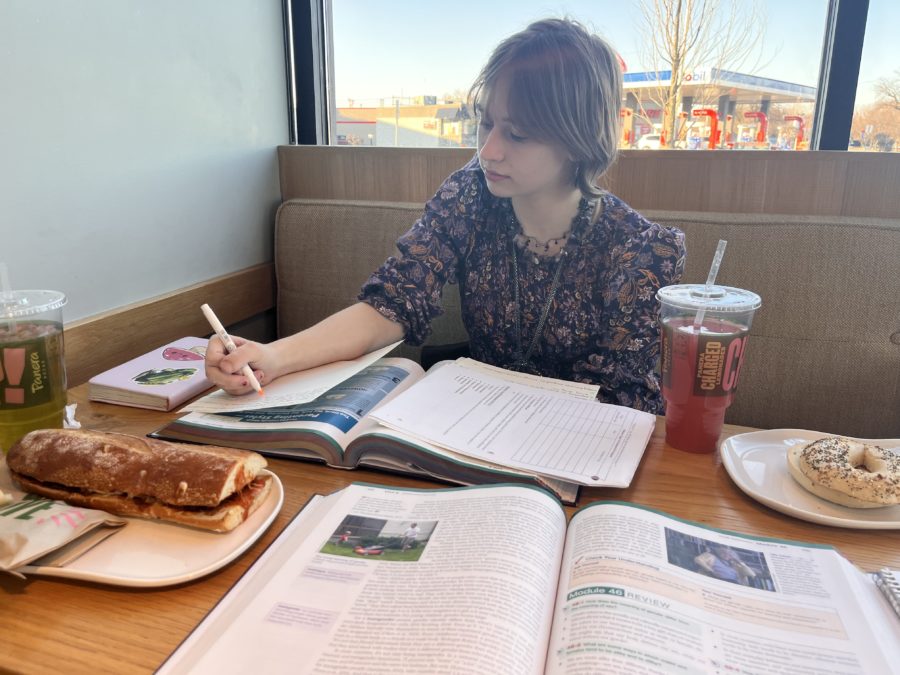Climbing the Mountain: How to Study for AP Exams
Senior Gray Garska completes a study guide for AP Psychology at a café. Study guides like these can later help students review for the AP exam!
As May approaches, so does exam season for Advanced Placement (AP) classes. The AP exams are modeled based on final exams in college, and if students do well, they can get college credit at many institutions. This can lead to students feeling a lot of pressure to study for these long exams, and some may not know where to start.
The majority of AP Exams have two parts: Multiple-Choice Questions (MCQs) and Free-Response Questions (FRQs). MCQs resemble questions that students may find on any test, though the questions themselves may be more difficult. FRQs, on the other hand, are any questions where the test taker has to write their own answer. This can range from a quick, written answer to a math question to entire essays. Each AP class has different formats for FRQs, and teachers usually practice FRQs pertaining to the exam in class. AP tests are scored on a scale of one to five, with five being the highest possible score. The score is compiled using a student’s scores on both the MCQ and FRQ sections of the test.
Because each class is so different, students may have to utilize a different approach for different kinds of classes. Mr. Fadoir teaches AP Calculus BC and AP Statistics, and his biggest exam advice was to focus on concepts you aren’t as confident in. “The difficult part of an AP exam is that the amount of material is very, very large, so one of the tricks to doing well is identifying weaknesses and then attacking those weaknesses through consistent review,” he explained. He spoke of a past student who made ten review sheets for Calculus, reviewed them on rotation at night before going to sleep, and got a five on the exam.

Mr. Fadoir also emphasized the importance of studying in groups, noting that research points to it being the most effective method. “When you are forced to verbalize big ideas, you make connections that you would not otherwise make,” he says. Talking through ideas can even be done when you are alone. Mr. Fadoir gives each of his students a tiny rubber duck at the beginning of each year and instructs them to speak to it when working through confusing concepts. “When you’re stuck, talk to the duck,” the saying goes.
FRQs for math and science exams are often not essay-based, which Mr. Fadoir acknowledges. “When you’re taking the AP Literature or Language exams, you’re writing down words. In exams like Calculus, Stats, or Chemistry, it’s very much a symbol-based world. We gotta know our symbols,” he says. Knowing what to expect out of the FRQs is often half the battle. “If you do enough FRQs, you realize the themes and can predict what kinds of problems will be on the exams”. This is also why Mr. Fadoir’s classes do a lot of practice problems, including FRQs. He says that repeated practice problems help him learn personally, so he applies that to his classes. “If I’m right, I can pat myself on the back, and if I’m wrong, I can learn from my weaknesses and attack them,” he states.
On the other side of the coin, AP Exams relating to English or the Social Sciences can be just as daunting. Ms. Hart is the AP Psychology teacher, and despite teaching a very different subject, she shared a lot of similar sentiments about studying with Mr. Fadoir. The first piece of advice she gave was also about studying in groups and talking out ideas. “Talking with your peers about the content is so helpful. If you can teach someone the content, you know it on a deeper level. Being able to explain is the true test to knowing the material,” she emphasizes. Ms. Hart also noted the importance of avoiding last-minute studying, saying to “not wait until the last minute, because then you’re cramming, there’s a lot of pressure, and you don’t have the time to focus on the things you don’t really know.”
While FRQs in math and sciences are often equation-based, the FRQs in a class like Psychology or Government often center on knowing vocabulary terms and being able to write about them. The College Board expects a certain quality of answer, and sometimes it will be difficult to gauge this. Ms. Hart says that the best way to combat this is to look at past FRQs that the College Board provides. “You not only can look up what College Board has used for FRQs in the past, but you can also see student examples and how they are scored,” she notes. She also uses an acronym for her class to help with writing FRQs, so she suggests utilizing any acronyms that your teacher may provide you. Additionally, some FRQs rely on the author remembering specific terms, something especially prevalent on the AP Psychology exam. Ms. Hart has a strategy for those times when you may forget what a certain term means during testing. “A lot of the time, it’s about context,” she says, “Look at the word you are given and compare it to the given scenario, then you can deduce an answer.” Overall, Ms. Hart’s focus is on collaboration and spacing out studying,
While teachers have an outside perspective on the AP exams, students have one derived from experience. After all, they are the ones taking them. Junior Nathaniel Healy took both the Biology and Computer Science Principles exams last year but said that he doesn’t usually study for tests. However, the strategies he did note using while preparing for the exams aligned closely with Mr. Fadoir’s suggestions. “I normally review notes from the entire year or determine the main topics that would be on the exam and work from there,” he says.
Even though studying for an AP exam is a lot of work, the act of reviewing content isn’t the only component to success. One’s mindset and physical state also contribute a great amount to focus and memory recollection. Both teachers agreed that one of the most imperative elements to exam success is maintaining healthy habits, and they concurred that eating well, sleeping, and getting exercise were all necessary pieces of that puzzle. As a Psychology teacher, Ms. Hart was particularly adamant. “Some people spend the whole night cramming the night before, and at that point, it is what it is,” she says. “Get your sleep.”
However, this may seem easier said than done. Striking a balance between stress and preparedness can be difficult, but it’s exactly what Mr. Fadoir says is necessary. “Know that a little bit of anxiety is ok, but too much is too much,” he says, “You want enough anxiety to make yourself sharp and focused, but you don’t want to be debilitated by it.” The best practice when preparing for the upcoming exams is to take care of yourself while simultaneously doing repeated and spread-out reviewing with others. Finally, it is easier to say this than to truly internalize it, but AP exams are not insurmountable tasks, and you are capable of doing well.







